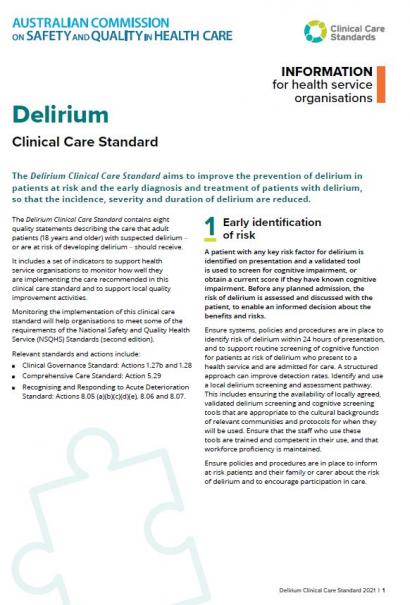Indicators for the Delirium Clinical Care Standard
Indicators have been developed to support monitoring of the care recommended in the Delirium Clinical Care Standard. Clinicians and health service organisations can use the indicators to support local quality improvement activities.
Indicator specifications
The definitions required to collect and calculate indicator data are specified in the Metadata Online Registry (METeOR).
METeOR is an Australian web-based repository of nationally endorsed data and indicator definitions, hosted by the Australian Institute of Health and Welfare (AIHW).
The indicators are a tool to support local quality improvement activities. No benchmarks are set for any indicator. Each indicator is described below and links to its specifications are provided.
List of indicators
Measuring and monitoring patient experiences
Systematic, routine monitoring of patients’ experiences of, and outcomes from, health care is an important way to ensure that the patient’s perspective drives service improvements and person-centred care. This is the case in all health services.
Patient experience measures
While there are no indicators in this standard specific to patient experience measurement, the Commission strongly encourages health service organisations to adopt the Australian Hospital Patient Experience Question Set (AHPEQS). The AHPEQS is a short 12 question generic patient experience survey which has been tested and found reliable and valid for both day-only and admitted hospital patients across a wide variety of clinical settings.
The AHPEQS question set is available for both private and public sector health services, and has been translated into 20 languages.
Patient-reported outcome measures
In Australia, patient-reported outcome measures (PROMs) are an emerging method of assessing the quality of health care. The Commission is leading a national work program to support the consistent and routine use of PROMs to drive quality improvement.
PROMs are standardised, validated questionnaires that patients complete, without any input from healthcare providers. They are often administered at least twice to an individual patient – at baseline and again after an intervention, or at regular intervals during a chronic illness. The information contributed by patients filling out PROMs questionnaires can be used to support and monitor the movement of health systems towards person-centred, value-based health care.
PROMs are being used to evaluate healthcare effectiveness at different levels of the health system, from the individual level to service and system levels. There is growing interest across Australia and internationally in the routine interrogation of patient-reported outcome information for evaluation and decision-making activities at levels of the health system beyond the clinical consultation.
Useful resources from the Commission
Questions
If you have any questions about the Delirium Clinical Care Standard please email ccs@safetyandquality.gov.au.

